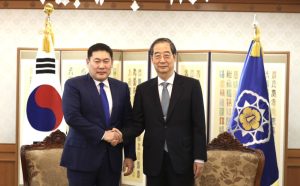Mongolian Prime Minister Oyun-Erdene Luvsannamsrai’s latest visit to South Korea at the beginning of April shed light on Ulaanbaatar and Seoul’s growing economic and cultural cooperation. Oyun-Erdene’s visit envisaged several economic initiatives Seoul could participate in, ranging from collaboration between large corporations to increasing tourism and promoting the Korean creative industry to enter Mongolia.
Mongolia and South Korea have shared deep cultural ties for decades. Since its launch in the 1990s, Korean pop culture, soap operas, and music industries have been a major inspiration for Mongolia’s creative and production industry. While this served as a foundation for cultural ties between Mongolia and South Korea, given contemporary Mongolia’s economic environment, Ulaanbaatar is seeking deeper cultural ties that promote and diversify its economic opportunities. These endeavors include combining tourism with innovative collaboration such as filming and entertainment production.
Since establishing their strategic partnership in 2021, Ulaanbaatar and Seoul have aimed to expand areas of bilateral cooperation, particularly pertaining to business-based economic growth. Korean businesses are seeking diverse investment opportunities in sectors such as medicine and biotech, agriculture, communications, and technology. Between 1990 and 2017, bilateral trade grew from $2 million to $200 million. The two governments are now aiming to boost economic ties via increasing investments and tourism.
While South Korea has become a leading destination for Mongolian tourists, the Mongolian government hopes to attract more Korean tourists and businesses. As of 2023, 40,000 Mongolians are living in South Korea, either studying, working, or traveling back and forth, and around 1,500 businesses in Mongolia are funded by South Korean capital. Around 3,500 South Koreans currently reside in Mongolia.
During Oyun-Erdene’s meeting with South Korean Prime Minister Han Duck-soo, he highlighted the 60 percent increase in Korean tourism to Mongolia in 2023. With the hope of increasing this number, Mongolia invited Korean talents, productions, filming, and other creative industries to explore what the country has to offer. These endeavors, in return, should boost Mongolia’s non-mining economic sectors, which includes tourism. According to Montsame, the Mongolian news agency, in 2023, the tourism industry generated “$1.2 billion in revenue.”
In promoting Mongolia’s attraction to the tourism industry, the “GoMongolia” brand took the initiative to collaborate with Korean creative industries to enter the Mongolian market.
GoMongolia – with the motto “Always Moving” – is a multifaceted branding that aims to attract foreign tourism and filming industries to highlight Mongolia’s nomadic society, vast landscape, culture, and uniqueness of its geography. But, more than this, it is a way for the current administration to equip Mongolian sectors with new technologies and capabilities that are needed to unlock opportunities in the modern age with global partners. As a strategic partner of Mongolia, South Korea can play a greater role in Mongolia’s efforts to diversify its economy.
It was no coincidence that Oyun-Erdene announced Mongolia’s tourism campaign, “Years to Visit Mongolia 2024-2025,” during his last official visit to Seoul in 2023. The tourism promotion, coupled with several bilateral agreements such as visa-free travel for citizens of South Korea to Mongolia for 90 days and VAT-free shopping for Korean tourists in Mongolia, opened the door for travelers and businesses.
Another important bilateral agreement included the Air Agreement to increase the number of flights and introduce new direct routes between the two countries. Through initiatives like these, Mongolia hopes to attract not just tourists but also other business opportunities and cultural engagements with South Korea.
From an economic perspective, Mongolia’s efforts to diversify its mining-dependent economy require innovation and creativity. In addition to promoting tourism, this effort involves inviting different businesses from different cultures and creating opportunities for collaboration between the public and private sectors. Recent digital partnerships with Google, SpaceX’s Starlink, and What3Words demonstrate Mongolia’s innovative ways to expand but also diversify its economy and workforce.
In the case of South Korea, Mongolia’s interest in increasing partnerships creates business opportunities for major corporations. The 2023 Mongolia-Korea Business Round Table discussion included “[r]epresentatives of more than 20 Korean companies, including K bank, KT group, Samsung C&T, Hyundai E&C, Daewoo E&C, Shinhan Financial Group, Seol Asan Medical Center, Seoul National University Hospital, Emart, and Highland.”
During these discussions, the two sides explored new avenues for bilateral trade such as small manufacturing, construction, agriculture, pharmaceuticals, and digital finance. An area of cooperation that could expand is promoting and supporting small-medium enterprises in Mongolia, not just Mongolian conglomerates.
These burgeoning public-private partnerships indicate the strengthening of Mongolia and South Korea’s economic and cultural ties. Moreover, as Mongolia’s strategic partner, South Korea donated $200,000 in humanitarian aid to Mongolia for the recent Dzud natural disaster.
As the two countries’ relations continue to grow, Mongolia hopes that South Korea’s tourism and creative industries can illuminate the country’s vast and unique landscape and culture, and by doing that, strengthen cultural ties between the Mongolian and the Korean people.

































